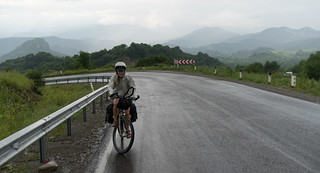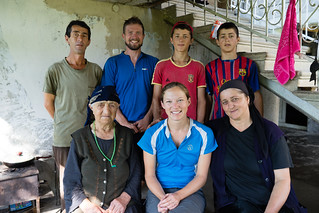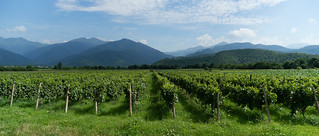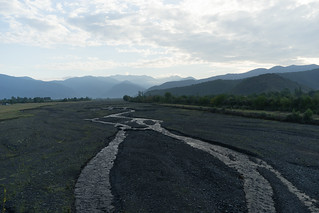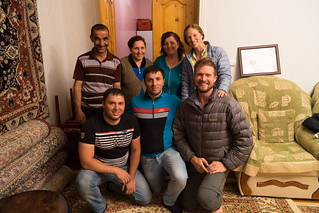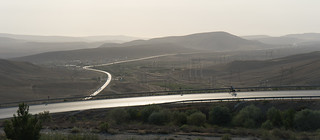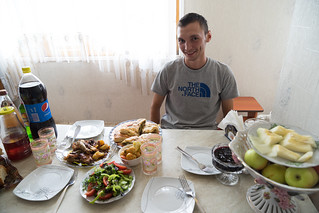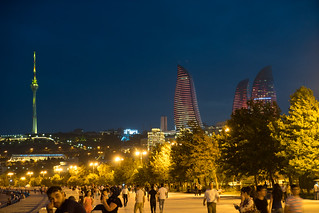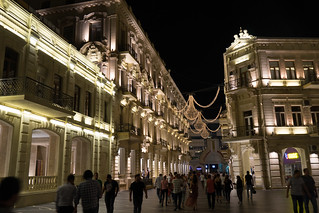After longer than expected in Tbilisi, enjoying lots of World Cup, fast Internet, and strolling around the old city, we departed on a Monday morning and rode east. The route was less than ideal, due to crazy drivers and terrible air quality (we learned from the Young Greens that there are no regulations on vehicles, and it shows). After about 20km of unpleasant riding, the road split: the main road continued along the foot of the mountains toward the border with Azerbaijan, while the other went over the mountains into Kakheti, a valley known as the center of Georgia’s wine-producing region. We chose the mountains to get away from the cars. It was the first time we didn’t do our research, so we didn’t know quite how much climbing was involved. The only map we had noted a 1900m (~6000ft) mountain on the road – “That can’t be right!” we thought – “The mountain must be to the side and the road must go through a lower pass.” After a couple hours of climbing and an elevation of 1100m, we made a bet. David guessed that the pass would be at 1301m, on the logic that passes are usually 400-700 m below the peak. Feeling obstinate, I guessed 1621. It wasn’t a bet I wanted to win, especially once it started raining. When the road topped out at 1655m, I celebrated my victory by putting on my raingear for the descent… and enjoying the view. Through the light rain and mist we could see rows and rows of peaks below us in the distance, and ahead of us lay a fun, if slick, descent. It took several more hours to reach the town of Telavi, where we planned to buy dinner food and then find a place to camp beyond the city limits. However, by that point we were soaked and tired, and we succumbed to the idea of a guesthouse where, according to the Lonely Planet, the wine “flows freely” at dinner. The rain continued off and on all night and into the next morning, so we took advantage of the wifi (are you seeing a theme here?) to order replacement gear for my mom to ship to us in Dushanbe and wrap up other things we’d somehow failed to do in Tbilisi.
When the rain stopped, we proceeded towards the border, stopping to visit the old city and church/museum at Gremi, and again at a winery where we tasted the best wine of the trip so far. Close to sunset, we started looking for a place to camp. We entered a small village and started asking around, but everybody told us – some with smiles, some looking alarmed by our presence – to go back to the main road. As we started to leave the village, a man who had overheard us asking his neighbor said ‘Dom!’ and motioned for us to come with him. He introduced himself as Omar, and, in broken English, told us we could sleep at his house. Omar told us that he – and the entire village, along with two neighboring villages – was Dagestani. This made sense, given how close to the border we were. Bariyat, our host in Tbilisi, had taught us how to say ‘thank you’ in Dagestani, and Omar was thrilled (or at least entertained) when we thanked him in his language. At his house, we met his mother, his lovely wife Jemila, and his three sons. He had a fourth son, who he told us, later that evening, had died of leukemia at the age of 15. We didn’t know how to express condolences, but we have found that the hand over the heart can mean a number of things, including ‘thank you’ and ‘I’m so sorry.’
Our experience there was such a blend of cultures. Like other Georgians we’d met, Omar brought out some wine and proposed several toasts, but unlike the others, he allowed us to politely decline when we’d had enough. We learned some more words in Dagestani, which he speaks with his mother, and in Russian, which he and his wife speak with their children. We told him we had our own food and tent, but we were served a delicious dinner of homegrown salad, homemade bread and cheese (with the cow watching us from the yard), and fish from a trout farm down the road. His mother didn’t join us until after sunset, as Ramadan had begun and she is an observant Muslim. Omar is a football fan, so we stayed up (too) late to watch Belgium defeat the US, then were given a comfortable bed rather than being allowed to set up our tent. Breakfast was another delicious meal, and as we left Jemila kept giving us food – a block of cheese for the road, tomatoes from the garden, some fresh hazelnuts. We shook hands goodbye, and Jemila pulled me back and gave me a smiling kiss on the cheek. When she smiles, I can see that her teeth – the few that remain – are all gold. I wish we could adequately convey what their hospitality means to us – being too effusive in our thanks could seem offensive, implying that we don’t think they have enough to share, and with 5 cows and a huge garden, I don’t think hosting us was too much of a burden. Inviting us in, though, gave us a glimpse into Georgian – and Dagestani – life that we wouldn’t have otherwise. It made us feel welcome in their country, and the warmth in Jemila’s goodbye made me feel taken care of, watched over by a mother, which is nice when we’re so far from home. I hope our many hosts have enjoyed our company as much as we enjoy theirs – whether it’s because we’re generally likable (I hope), or hosting us makes them feel good about their ability to be generous, or just for the chance to meet people from far away. These are highlights of our trip.
The next day, we made it to the Azerbaijan border. The sign announcing the border says ‘good luck’ on the bottom, and the Georgian border guard told us “you are leaving the last European Christian nation… Good luck” as he stamped us out. Nonetheless, everything went smoothly (the e-visa we had been emailed in Turkey worked just fine) and we were through without a hitch into very rural Azerbaijan. After riding for awhile we managed to change money in Beleken, the first town (even though we didn’t know that was the currency until then), and also checked Internet to figure out our route. We decided to follow the mountains all the way, taking a smaller road to the main highway near Baku. We rode along the Kura valley for the next two days, taking long lunch breaks to avoid the worst of the heat. We crossed many small, depleted streams along the way, and David became obsessed with the topography after realizing that we were biking uphill to each river – up the alluvial fan coming out of the mountains, crossing the very small stream winding its way through all the deposited sediment – then down the other side. We had great campsites – the first night close to one of these streams (fortunately we hopped a retaining wall into a nearby field, as the river shifted course during the night into one of the canals alongside it, and there was a crazy thunderstorm – things were a bit muddy on the way out), and the second night in an open patch among tall enough scrub to conceal us completely from the road. We had enough water, and it was warm enough, to take a water bottle ‘shower’ before bed, which felt great.
On the third day, an SUV pulled over beside us a bit before sunset and the people inside, after asking about our plans and learning that we intended to camp, invited us to their home. It was 20km away, but the lure of a shower, bed, and local company was strong. We barely made it to the turnoff to their town (I hadn’t eaten enough and I crashed in the middle of the final big climb), but when we got there, with the help of some people outside a store, we called them and they came to take us the final 5km, since we didn’t have an exact address. They were a big, friendly family from a larger town near Baku, with aunts and uncles and grandparents all spending Ramadan at their mountain compound. Only one person spoke any English and she disappeared pretty early, so one of the brothers Skyped his girlfriend, who proceeded to translate all night. I recently learned a term that describes perfectly what we experienced in Azerbaijan: guerrilla hospitality. You have no choice. Hosts will hover until you finish in the bathroom in order to find out what you need next; people will practically drag you off the road for chai or to take a picture. It’s well-intentioned but can be a bit intense, especially when you’re tired or simultaneously dodging cars (oh yeah – another fun Azerbaijani trick: swerving towards you as if to hit you, then stopping short. Haha!).
The next day the landscape finally delivered what we’d been promised – hot, dry, desert – and a lot of difficult climbs. We camped that night off the road and up a steep hill, behind debris piles made during the construction of a new road. We left at sunrise and had great riding most of the morning. The new road hadn’t opened yet but was paved, so we had a wide, car-free ‘bike path’ for a lot of the way to Baku. At one point we stopped and had a private dance party in celebration of our friends Josh and Meghana’s wedding, which was happening that day. The last few days we’d experienced our first bit of homesickness – thinking of the wedding we were missing, and seeing friends’ posts about their 4th of July weekends – in the mountains or on a river – made us feel far away and that we’d been gone a long time. However, with the exception of more long, hot climbs and the occasional bout of grumpiness (mostly on my part, I admit), we were still having a good time, and we made it to Baku in the mid-afternoon. Our warmshowers host, Cavid (pronounced Tcha-veet, roughly), met us in the middle of the road a few blocks from his house – we were having trouble finding it (despite great directions we had just failed to read) and called him. The call didn’t go through but it registered on his phone, so he set out to find us. Turns out we are not that hard to find :)
We spent the next 4 nights at Cavid’s very friendly family’s apartment. He’s the only one who spoke English, but his mother smilingly served us as many meals a day as she could, and his brother gave us a ride to the Turkmenistan embassy to see if we could get a visa – we were still entertaining thoughts of going there despite not having received an email with a code that was supposed to come through after submitting an application in Ankara (embassy was closed; glad we got a Kazakhstan visa!). Cavid had just gotten back from his one year of obligatory military service and had a lot of interesting observations about the military and the country to share. We had two meetings with professors who work on water resources, arranged by a friend of a friend, Khumar, who took us out to an incredible lunch at a traditional Azerbaijani restaurant. We also had dinner with a couple who had offered to host us through Couchsurfing – when we told Cavid we had another offer, he convinced us to stay at his house, and we were happy to accept. After speeding through the country, it was great to meet so many people in Baku and to hear their perspectives on life in Azerbaijan. Overall, standards of living seem pretty good (at least in the city – we didn’t go as deep into villages as we had in Georgia, and some people said there was a lot of poverty), but the system is broken – teachers and doctors get tiny salaries, so doctors demand bribes to actually treat you. Government posts are sought after, but a bribe is required to get one, no matter how qualified you are. Oil money is pouring in, and it shows in the (mostly) great roads and brand new shiny buildings, but the education system is terrible. We really enjoyed Baku – it’s a beautiful city, with a lovely and well-preserved old town and crazy new buildings and the world’s 2nd largest flagpole outside the city walls. There is a fondness for lighting things up, and the city’s new Flame Towers are not only shaped like tongues of fire, they are lit up with flame-colored lights – alternating with the waving Azerbaijani flag – at night.
On our second day in Baku, we had gone to the port, following the detailed directions left on blog postings by helpful fellow travelers. The elusive ‘kassa’ or ticket window was closed, but some friendly men invited us into their heavily air-conditioned office and explained in their best Turk/Azeri/Ruski that there are boats to Aktau nearly every day, including 2 that night, and that we just need to come back the day we want to leave, preferably between 9 and 10, or 4 and 5, when the kassa is most likely to be open. This was great news, as reports of ships from Baku range from ‘nearly every day in the summer’ to ‘you could wait up to 2 weeks.’ On Thursday at 4:00 we returned to the port, hoping for a Friday boat. The kassa was closed (the ticket lady was eating; or sleeping? We’re not sure, but she wasn’t there), but we were told there was a boat the next day at 10AM and that we should come back in 2 hours to buy tickets. We returned at 6 (conveniently, there is a nice park for napping as well as an expensive cafe with wifi just beyond the wall behind the port), and the door to the kassa was open but she was still not there. “15 minutes!” said the men in the office. Back to the park, then the port again. The ticket lady is there! Forms were filled out, money exchanged, and then the instructions: come to the port at midnight to go through customs and board the ship. It leaves at… 1AM? 4? We couldn’t tell. We felt a bit frantic, as we thought we had one more night to accomplish our remaining errands (cut most of my hair off to better cope with the heat and quick, cold showers, and shave David’s beard that is getting long enough to prompt people to point and joke ‘Musulman!’; buy food and water for the trip; get US dollars to change in Uzbekistan, as ATMs give a terrible rate; take a tour of the city with Cavid’s brother and see oil-damaged areas near town; buy postcards…) Oh well! We asked about a later boat and the answer was ‘yok!’ meaning that there aren’t any that they know of. So we scrambled off to take care of the essentials (we are still quite hairy), pack up, have one last meal with Cavid and his family, and hug them all goodbye with profuse thanks in all the languages we might possibly have in common. We set off into the night, biking through the Old City to the port – stay tuned for our next post on crossing the Caspian!







